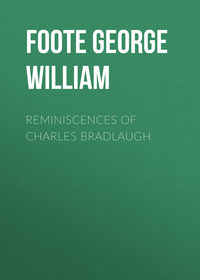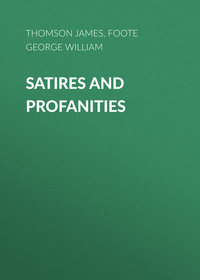 полная версия
полная версияFlowers of Freethought (Second Series)
Pliny, who corresponded with the emperor Trajan, and whose name is familiar to the student of Christian Evidences, exhorted parents to take a deep interest in the education of their children. He largely endowed an institution in his native town of Como, for the assistance of the children of the poor. His humanity was extended to slaves. He treated his own with great kindness, allowing them to dispose of their own earnings, and even to make wills. Of masters who had no regard for their slaves, he said, "I do not know if they are great and wise; but one thing I do know, they are not men." Dion Chrysostom, another Stoic, plainly declared that slavery was an infringement of the natural rights of men, who were all born for liberty; a dictum which cannot be paralleled in any part of the New Testament. It must be admitted, indeed, that Paul, in sending the slave Onesimus back to his master Philemon, did bespeak humane and even brotherly treatment for the runaway; but he bespoke it for him as a Christian, not simply as a man, and uttered no single word in rebuke of the institution of slavery.
Plutarch's humanity was noble and tender. "The proper end of man," he said, "is to love and to be loved." He regarded his slaves as inferior members of his own family. How strong, yet how dignified, is his condemnation of masters who sold their slaves when disabled by old age. He protests that the fountain of goodness and humanity should never dry up in a man. "For myself," he said, "I should never have the heart to sell the ox which had long labored on my ground, and could no longer work on account of old age, still less could I chase a slave from his country, from the place where he has been nourished for so long, and from the way of life to which he has been so long accustomed." Sentiments like these were the natural precursors of the abolition of slavery, as far as it could be abolished by moral considerations.
Epictetus, the great Stoic philosopher, who had himself been a slave, taught the loftiest morality. Pascal admits that he was "one of the philosophers of the world who have best understood the duty of man." He disdained slavery from the point of view of the masters, as he abhorred it from the point of view of the slaves. "As a healthy man," he said, "does not wish to be waited upon by the infirm, or desire that those who live with him should be invalids, the freeman should not allow himself to be waited upon by slaves, or leave those who live with him in servitude." It is idle to pretend, as Professor Schmidt of Strasburg does, that the ideas of Epictetus are "colored with a reflection of Christianity." The philosopher's one reference to the Galileans, by whom he is thought to have meant the Christians, is somewhat contemptuous. Professor Schmidt says he "misunderstood" the Galileans; but George Long, the translator of Epictetus, is probably truer in saying that he "knew little about the Christians, and only knew some examples of their obstinate adherence to the new faith and the fanatical behavior of some of the converts." It should be remembered that Epictetus was almost a contemporary of St. Paul, and the accurate students of early Christianity will be able to estimate how far it was likely, at that time, to have influenced the philosophers of Rome.
Marcus Aurelius was one of the wisest and best of men. Emperor of the civilised world, he lived a life of great simplicity, bearing all the burdens of his high office, and drawing philosophy from the depths of his own contemplation. His Meditations were only written for his own eyes; they were a kind of philosophical diary; and they have the charm of perfect sincerity. He was born a.d. 121, he became Emperor a.d. 161, and died a.d. 180, after nineteen years of a government which illustrated Plato's words about the good that would ensue when kings were philosophers and philosophers were kings. Cardinal Barberini, who translated the Emperor's Meditations into Italian, in 1675, dedicated the translation to his own soul, to make it "redder than his purple at the sight of the virtues of this Gentile."
Marcus Aurelius combines reason with beautiful sentiment. His emotion is always accompanied by thought. Here, for instance, is a noble passage on the social commonwealth – "For we are made for co-operation, like feet, like hands, like eyelids, like the rows of the upper and lower teeth. To act against one another then is contrary to nature; and it is acting against one another to be vexed and to turn away." In a still loftier passage he says – and let us remember he says it to himself, not to an applauding audience, but quietly, and with absolute truth, and no taint of theatricality – "My nature is rational and social; and my city and country, so far as I am Antoninus, is Rome; but so far as I am a man, it is the world." In his brief, pregnant way, he states the law of human solidarity – "That which is not good for the swarm, neither is it good for the bee." And who could fail to appreciate this sentiment, coming as it did from the ruler of a great empire? – "One thing here is worth a great deal, to pass thy life in truth and justice, with a benevolent disposition even to liars and unjust men."
Here again, it is the fashion in some circles, to pretend that Marcus Aurelius was influenced by the spread of Christian ideas. George Long, however, speaks the language of truth and sobriety in saying, "It is quite certain that Antoninus did not derive any of his Ethical principles from a religion of which he knew nothing." To say as Dr. Schmidt does that "Christian ideas filled the air" is easy enough, but where is the proof? No doubt the Christian writers made great pretensions as to the spread of their religion, but they were notoriously sanguine and inaccurate, and we know what value to attach to such pretensions in the second century when we reflect that even in the fourth century, up to the point of Constantine's conversion, Christianity had only succeeded in drawing into its fold about a twentieth of the inhabitants of the empire. Enough has been said in this article to show that the idea of our common humanity is not "a purely Christian conception," that it arose in the natural course of human development, and that in this, as in other cases, the apologists of Christianity have simply appropriated to their own creed the fruits of the political, social, and moral growth of Western civilisation.
THE SONS OF GOD
"The sons of God saw the daughters of men that they were fair."
– Genesis vi. 8.According to the first book of the Bible, the earth fell into a very wicked condition in the days of the patriarchs. God made everything good, but the Devil turned everything bad; and in the end the Lord put the whole concern into liquidation. It was a case of universal bankruptcy. All that was saved out of the catastrophe was a consignment of eight human beings and an unknown number of elephants, crocodiles, horses, pigs, dogs, cats, and fleas.
Among other enormities of the antediluvian world was the fondness shown by the sons of God for the daughters of men. That fondness has continued ever since. The deluge itself could not wash out the amatory feelings with which the pious males regard those fair creatures who were once supposed to be the Devil's chief agents on earth. Even to this day it is a fact that courtship goes on with remarkable briskness in religious circles. Churches and chapels are places of harmless assignation, and how many matches are made in Sunday-schools, where Alfred and Angelina meet to teach the scripture and flirt. As for the clergy, who are peculiarly the sons of God, they are notorious for their partiality to the sex. They purr about the ladies like black tom-cats. Some of them are adepts in the art of rolling one eye heavenwards and letting the other languish on the fair faces of the daughters of men. It is also noticeable that the Protestant clericals marry early and often, and generally beget a numerous progeny; while the Catholic priest who, being strictly celibate, never adds to the population, "mashes" the ladies through the confessional, worming out all their secrets, and making them as pliable as wax in his holy hands. Too often the professional son of God is a chartered libertine, whose amors are carried on under a veil of sanctity. What else, indeed, could be expected when a lot of lusty young fellows, in the prime of life, foreswear marriage, take vows of chastity, and undertake to stem the current of their natures by such feeble dams as prayers and hymns?
Who the original "sons of God" were is a moot point. God only knows, and he has not told us. But Jewish and Christian divines have advanced many theories. According to some the sons of Gods were the offspring of Seth, who was born holy in succession to righteous Abel, while the daughters of men were the offspring of wicked Cain. Among the oriental Christians it is said that the children of Seth tried to regain Paradise by living in great austerity on Mount Hermon, but they soon tired of their laborious days and cheerless nights, and cast sheep's-eyes on the daughters of Cain, who beauty was equal to their father's wickedness. Marriages followed, and the Devil triumphed again.
According to the Cabbalists, two angels, Aza and Azael, complained to God at the creation of man. God answered, "You, O angels, if you were in the lower world, you too would sin." They descended on earth, and directly they saw the ladies they forgot heaven. They married and exchanged the hallelujahs of the celestial chorus for the tender tones of loving women and the sweet prattle of little children. Having sinned, or, to use the vile language of religion, "polluted themselves with women," they became clothed with flesh. On trying to regain Paradise they failed, and were cast back on the mountains, where they continued to beget giants and devils.
"There were giants in the earth in those days" says Scripture. Of course there were. Every barbarous people has similar legends of primitive ages. The translators of our Revised Version are ashamed of these mythical personages as being too suggestive of Jack and the Beanstalk, so they have substituted Anakim for giants. In other words, they have shirked the duty of translators, and left the nonsense veiled under the original word.
The Mohammedans say that not only giants, but also Jins, were born of the sons of God, who married the daughters of men. The Jins soon had the world in their power. They ruled everywhere, and built colossal works, including the pyramids.
Of the giants, the most remarkable was Og. He was taller than the last Yankee story, for at the Deluge he stopped the windows of heaven with his hands, or the water would have risen over his head. The Talmud says that he saved himself by swimming close to the ark in company with the rhinoceros. The water there happened to be cold, while all the rest was boiling hot; and thus Og was saved while all the other giants perished. According to another story, Og climbed on the roof of the ark, and when Noah tried to dislodge him, he swore that he would become the patriarch's slave. Noah at once clinched the bargain, and food was passed through a hole for the giant every day.
When we look into them we find the myths of the Bible wonderfully like the myths of other systems. The Giants are similar to the Titans, and the union of divine males with human females is similar to the amors of Jupiter, Apollo, Neptune, and Mars with the women of old. In this matter there is nothing new under the sun. Every fresh myth is only the recasting of an ancient fable, born of ignorance and imagination.
Let it finally be noted that this old Genesaic story of the angelic husbands of earthly women gives us a poor idea of the felicity of heaven. In that unknown region, as Jesus Christ informed his disciples, there is neither marrying nor giving in marriage; that is, no males, no females, no courting, no loving, no children, and no homes. Men cease to be men and women cease to be women. Everybody is of the neuter gender.
Or else all the angels are gentlemen, without a lady amongst them. Perhaps the latter view is preferable, as it harmonises with the Bible, in which the angels are always he's. In that case heaven would be, to say the least, rather a dull place. No whispering in the moonlight, no clasped hands under the throbbing stars. Not even a kiss under the misletoe. Oh, what must it be to be there! No wonder the sons of God wandered from their cheerless Paradise, visited this lower world, and saw the daughters of men that they were fair.
MELCHIZEDEK
Melchizedek is the most extraordinary person of whom we have any record. Christ was born and Adam was made, but Melchizedek never began to be and will never cease to exist. If the Bible were not such an intensely serious book without a gleam of humor, except of the unconscious Hibernian kind, we might conclude that Melchizedek was nobody, for the description admirably suits that character. But the Bible does not play and must not be played with. All its personages are bona fide realities, from the Ancient of Days with white woolly hair on the throne of heaven to the prophet Jonah who took three days' lodging in the belly of a whale.
The name Melchizedek means king of justice, being derived from melec, a king, and tzedec, justice. When the gentleman bearing this name is introduced to us in the fourteenth of Genesis, he is king of Salem, which means peace. Salem was a city on the site of Zion.
Originally it was called Jebus, then Zadek, then Salem, and finally Jerusalem. So says Rabbi Joseph Ben-Gorion. But other writers, no doubt just as well informed, differ from him; and while the doctors disagree, simple laymen may well hold their judgment in suspense; or, better still, dismiss Jebus, Zadek, Salem, and Jerusalem, to the limbo of learned trivialities. Counting the spots on a leopard, the quills on a porcupine, or the hairs in a cat's whiskers, is just as amusing and quite as edifying as most of the problems of divines and commentators.
When Abraham returned from a successful campaign, in which he defeated five kings and their armies with three hundred and eighteen raw recruits, Melchizedek came out to meet him with victuals and drink. These two friends joined in the friendly office of scratching each other. They were, in fact, a small mutual admiration society. Abraham, although at other times a rank coward, was on this occasion a bold warrior laden with spoil; and Melchizedek besides being King of Salem, was "the priest of the most high God." "Bully for you, Abraham," said Melchizedek. "Bully for you, Melchizedek," said Abraham. As usual, however, the priest got the best of it, for the patriarch paid him tithes, which were a capital return for his compliments. Genesis is a little confused, indeed; and what scripture is not? "And he gave him tithes of all" is not very clear. It reminds one of the West of England yokel, who gave his evidence on a case of homicide in this way:
"He had a stick, and he had a stick; and he hit he, and he hit he. And if he'd only hit he as hard as he hit he, he'd a' killed he, and not he he."
But we must not be too hard on Bibles and yokels. So long as we can get a scintillation of their meaning we must be satisfied. Scripture, we may take it, means that the he who paid tithes was Abraham, and the him who received them was Melchizedek.
Now the book of Genesis is not an early, but a very late portion of the Jewish scriptures, dating only a few centuries before Christ. And we may depend on it that this little sentence about tithes, and perhaps the whole story that leads up to it, was got up by the priests, to give the authority of Abraham's name and the sanction of antiquity to an institution which kept them in luxury at the expense of their neighbors.
Our view of the case is supported by the fact that Melchizedek's name does not appear again in the whole of the Old Testament, except in the hundred and tenth Psalm, where somebody or other (the parsons of course say Christ) is called "a priest for ever after the order of Melchizedek." Paul, or whoever wrote the Epistle to the Hebrews, works up this hint in fine style. It would puzzle a lunatic, or a fortune-teller, or the Archbishop of Canterbury, or God Almighty himself, to say what the Seventh of Hebrews means. We give it up as an insoluble conundrum, and we observe that every commentator with a grain of sense and honesty does the same. But there is one luminous flash in the jumble of metaphysical darkness. Melchizedek is described as "without father, without mother, without descent, having neither beginning of days nor end of life." It will be easy to recognise a gentleman of that description when you meet him. When we do meet him we shall readily acknowledge him as our king and priest, and pay him an income tax of two shillings in the pound; but until then we warn all kings and priests off our doorsteps.
Jewish traditions say that Melchizedek was the son of Shem, and set apart for the purpose of watching and burying Adam's carcase when it was unshipped from the Ark. Some, however, maintain that he was of a celestial race; while other (Christian) speculators have held that he was no less than Jesus Christ himself, who put in an early appearance in Abraham's days to keep the Jewish pot boiling. St. Athanasius tells a long-winded story of Melchizedek and Abraham, which shows what stuff the early Christians believed. According to the Talmud, Melchizedek composed the hundred and tenth Psalm himself; and although he is without end of days, his tomb was shown at Jerusalem in the time of Gemelli Oarrere the traveller.
There was an heretical sect called the Melchizedekiana in the third century. They held that Jesus Christ was, according to Hebrews, only of the order of Melchizedek, and therefore that Melchizedek himself was the more venerable. This heresy revived in Egypt after its suppression elsewhere, and its adherents claimed that Melchizedek was the Holy Ghost. The last time Melchizedek was heard of he was a London coster-monger's donkey, but whether this was a real incarnation of the original Melchizedek no one is able to decide, unless the Lord should again, as in the case of Balaam's companion, "open the mouth of the ass" and inform the world of the things that belong unto its peace.
S'W'ELP ME GOD
Whoever has seen a Hebrew money-lender in a County Court take up a copy of the Old Testament, present the greasy cover to his greasy lips, and, like honest Moses in the School for Scandal, "take his oath on that," must have had a lively impression as to the value of swearing as a religious ceremony. And this impression must have been heightened when he has seen an ingenuous Christian, on the other side of the suit, present a copy of the New Testament to his pious lips, and quietly swear to the very opposite of all that the God-fearing Jew had solemnly declared to be the truth, the whole truth, and nothing but the truth. One's appreciation of the oath is still further increased by watching the various litigants and witnesses as they caress the sacred volume: Here a gentleman wears an expression of countenance which seems to imply "I guess they'll get a good deal of truth out of me"; and there anothers face seems to promise as great a regard for truth as is consistent with his understanding with the solicitor who subpoenaed him as an independent witness in the interest of justice and a sound client. Hard swearing is the order of the day. So conflicting is the evidence on simple matters of fact that it is perfectly obvious that the very atmosphere is charged with duplicity. The thing is taken as a matter of course. Judges are used to it, and act accordingly, deciding in most cases by a keen observation of the witnesses and an extensive knowlege of the seamy side of nature. But sometimes the very judges are nonplussed, so brazen are the faces of the gentlemen who "have kissed the book" Very often, no doubt, their honors feel inclined to say, like the American judge in directing his jury, "Well, gentlemen, if you believe what these witnesses swear, you will give a verdict for the plaintiff; and if you believe what the other witnesses swear, you will give a verdict for the defendant; but if, like me, you don't believe what either side swears, I'm hanged if I know what you will do."
The fact is, the oath is absolutely useless if its object is to prevent false witness. Should there be any likelihood of a persecution for perjury, a two-faced Testament-kisser will be on his guard, and be very careful to tell only such lies as cannot be clearly proved against him. He dreads the prospect of daily exercise on the treadmill, he loathes the idea of picking oakum, and his gorge rises at the thought of brown bread and skilly. But so long as that danger is avoided, there are hosts of witnesses, most of them very good Christians, who have been suckled on the Gospel in Sunday Schools, and fed afterwards on the strong meat of the Word in churches and chapels, who will swear fast and loose after calling God to witness to their veracity. They ask the Almighty to deal with them according as they tell the truth, yet for all that they proceed to tell the most unblushing lies. What is the reason of this strange inconsistency? Simply this. Hell is a long way off, and many things may happen before the Day of Judgment. Besides, God is merciful; he is always ready to forgive sins; a man has only to repent in time, that is a few minutes before death, and all his sins will be washed out in the cleansing blood of Christ. Notwithstanding all his lies in earthly courts, the repentant sinner will not lose his right of walking about for ever and ever in the court of heaven, although some poor devil whose liberty or property he swore away may be frizzling for ever and ever in hell.
We are strongly of opinion that if the oath were abolished altogether there would be fewer falsehoods told in our public courts. No doubt the law of perjury has some effect, but it is less than is generally imagined, partly because the law is difficult to apply, and partly because there is a wide disinclination to apply it, owing to a sort of freemasonry in false witness, which is apt to be regarded as an essential part of the game of litigation. Here and there, too, there may be a person of sincere piety, who fears to tell a lie in what he considers the direct presence of God. But for the most part the fear of punishment, in this world or in the next, will not make men veracious. The fact is proved by universal experience; nay, there are judges, as well as philosophers, who openly declare that the oath has a direct tendency to create perjury. Anyone, with a true sense of morality will understand the reason of this. Fear is not a moral motive; and when the threatened punishment is very remote or very uncertain, it has next to no deterrent effect. Cupidity is matched against fear, and the odds of the game being in its favor, it wins. But if a moral motive is appealed to, the case is different. Many a man will tell a lie in the witness-box who would scruple to do so "on his honor"; many a man will lie before God who would scruple to deceive a friend. Let a man feel that he is trusted, let his self-respect be appealed to, and he is more likely to be veracious than he would be if he were threatened with imprisonment in this life and hell-fire in the next.
Why Christians should cling to this relic of barbarity it is difficult to conceive. Their Savior plainly commanded them to "Swear not at all," and the early Church obeyed this injunction until it rose to power under Constantine. It is also a striking fact that the apostle Peter, when he disobeyed his Master, and took an oath, used it to confirm a palpable lie. When the damsel charged him in court with having been a follower of Jesus, he "Denied it with an oath." "You were one of them," said the damsel. "I wasn't," said Peter. "You were with him," she rejoined. Whereupon Peter exclaimed "S'w'elp me God, I never knew him." Surely if self-interest made Peter commit flat perjury in the bodily presence of his Savior, it is idle to assert that the oath in any way promotes veracity.
INFIDEL HOMES.3
John Wesley was a man of considerable force of mind and singular strength of character. But he was very unfortunate, to say the least of it, in his relations with women. His marriage was a deplorable misunion, and his latest biographer, who aims at presenting a faithful picture of the founder of Wesleyanism, has to dwell very largely on his domestic miseries. Wesley held patriarchal views on household matters, the proper subordination of the wife being a prime article of his faith. Mrs. Wesley, however, entertained different views. She is therefore described as a frightful shrew, and rated for her inordinate jealousy, although her husband's attentions to other ladies certainly gave her many provocations.











